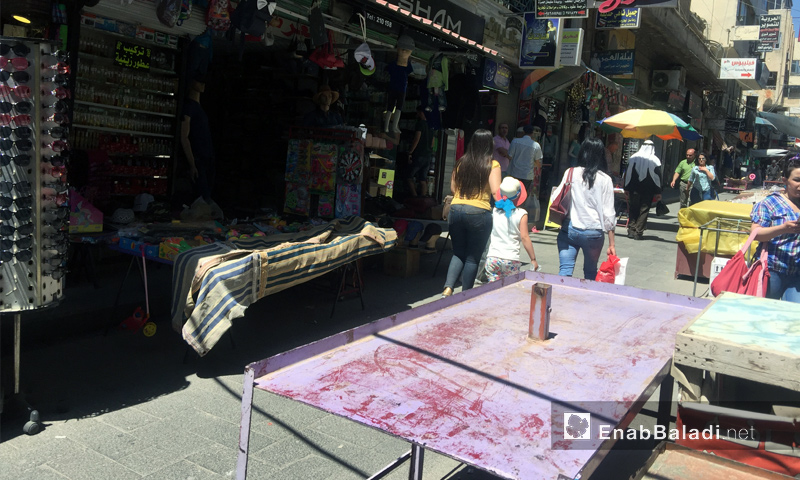



The majority of As-Suwayda city’s population did not celebrate Eid al-Fiter in former years, but with the massive number of people fleeing from the burring areas in Syria to the city, Ramadan and Eid al-Fitr following it witnessed a revival in the city.
As-Suwayda is known as “the capital of the Druze Denomination” in Syria; the sect’s religious practices do not include fasting in Ramadan, rather the first ten days of Dhul Hijjah, August, which makes Eid al-Adha the only acknowledged religious holiday in the governorate.
However, following 2011, As-Suwayda witnessed a new social activity which resulted of the increasing displacement waves to it and as an effect of the newcomers’ practice of their rituals, Ramadan’s atmosphere took over the markets.
As-Suwayda remained one of the “safest” Syrian areas, as it has been neutralized from the military action, which made it a target to IDPs, whose number is estimated with more than 70 thousand refugees.
Khaled, a young man from the town of al-Mtoneh in the northern countryside of the city, described the city’s social life before and after the arrival of the displaced people, since the city has for many years celebrated al-Adha Eid alone, except for a single Sunni family, with which the town’s people used to share the joy of Eid al-Fitr, inviting intimate memories about his father and his habit like phrase on the Eid’s morning: “Come on dears, get up and be prepared; we shall pay al-Jamal family the Eid visit.”
With influx of people from different Syrian areas to As-Suwayda, al-Jamal family’s case was generalized, and each neighborhood or residential concentration started to incubate a number of Sunni families, who succeeded in bonding with the local people. This triggered a real Eid-driven activity on the streets and in gardens and markets, in addition to the neighbors who met to make the Eid sweets or exchanged short visits in celebration of Eid al-Fitr
Along with the social changes, the city witnessed a novel economic action, triggered by Eid al-Fitr’s economic movement, as the newcomers headed to the markets to do the Eid shopping, which notably reenergized the markets and gave the clothes and food related materials shop owners’ a new crowd of buyers.
One of the people working in the “Khdair” Food Shops, refusing to reveal his name, told Enab Baladi that the market’s activity was restricted to Eid al-Adha, but with the celebration of Eid al-Fitr, the merchants started to have two seasons on which business is freshened.
He stressed that there was an increasing demand on flour, sugar and other raw materials needed for homemade sweets, in addition to the different types of chocolate and “candies” that consist a crucial part of the Eid’s hospitality rites. This is in addition to children’s increasing presence in entertainment centers and playgrounds, where children from different regional backgrounds share the joys of Eid regardless of political considerations, conflicts or sectarianism which, to a certain degree, As-Suwayda managed to keep away from despite the controversy of Syria’s current conditions.
if you think the article contain wrong information or you have additional details Send Correction